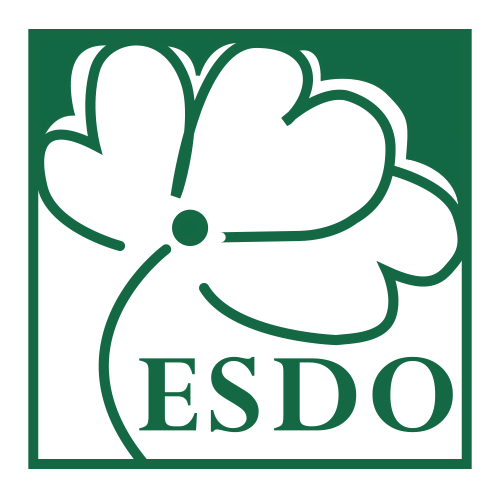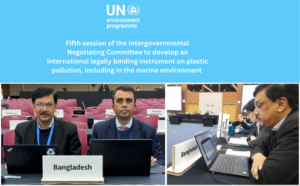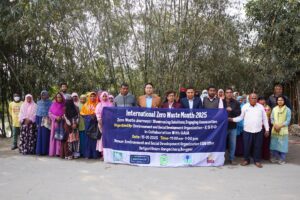Dhaka, October 21, 2018: To protect environment and public health it’s an urgent need to ban lead paint in Bangladesh. The standard of lead concentration in paint below 90 ppm has imposed recently, but still striving for a regulation. Focusing on this purpose and to observe ‘‘International lead poisoning prevention week of Action 2018”, a group of experts and activists urged together in a round table meeting. The Meeting was organized by Environment and Social Development Organization-ESDO in association with the Department of Environment on Sunday, at Conference Room, of DoE.
“Although Bangladesh Standard and Testing Institutions (BSTI) have already published an SRO on the standard of Lead content in paint below 90 ppm, we are still striving for a regulation in this regard.” Explained Dr. Sultan Ahmed , Director General of Department of Environment-DoE.
Dr. Sultan express his appreciations to ESDO for its continues efforts to ‘Lead Free Paints’. He said, ESDO efforts has foster the government initiative to Paints standard and legislation. The meeting was preside over by Dr. Sultan Ahmad, Director General of DoE, speakers are former secretary of environment and ESDO Chairperson Syed Marghub Murshed, Professor Abu Jafor Mahmood, Dhaka University, Prof. Abul Hasam, Jahangirnagar University, Quazi Sarwar Imtiaz Hashmi , Additional Director General of DoE, Dr. Shahriar Hossain secretary general and Siddika Sultana executive director of ESDO.
ESDO Chairperson and former Secretary Syed Marghub Murshed said, “The Global Alliance to Eliminate Lead Paint was formed in 2011 to promote the phase-out of the manufacture and sale of paints containing lead and eventually to eliminate the risks that such paints pose. He informed that in Bangladesh ESDO had been working since 2008 from awareness raising activities to policy advocacy on the issue of ‘Ban Lead Paint’ and which has been leading the country to have a standard and moving towards a regulation.
To eliminate lead in paints globally, Global Alliance to Eliminate Lead in Paint (GAELP) observes ‘International Lead Poisoning Prevention Week’ every year. As of October 2017, according to WHO and UN Environment, only 68 countries (34%) have confirmed that control
measures are in place. These control measures vary, however, in the degree to which they protect against lead exposure, with limits on lead content ranging from 90 ppm to 20 000 ppm. The Lead Paint Alliance set a target that by 2020 all countries should have in place such a regulatory framework. In a survey carried out by WHO and the United Nations Environment Programme, (UN Environment), which jointly coordinate the Lead Paint Alliance, as of 30 June 2018 only 69 governments confirmed that they have legally binding control measures on lead paint. But WHO has 194 Member States, so there is still, a significant gap to achieving the 2020 goal set by the Global Alliance to Eliminate Lead paint that all countries should have banned lead paint.
Lead poisoning is preventable, yet the Institute for Health Metrics and Evaluation has estimated that, based on 2016 data, lead exposure accounted for 540 000 deaths and 13.9 million years lost to disability and death due to long-term health effects, with the highest burden in developing regions. Of particular concern is the role of lead exposure in the development of intellectual disability in children. Even though there is wide recognition of the harmful effects of lead and many countries have taken action, exposure to lead, particularly in childhood, remains of key concern to health care providers and public health officials worldwide. An important source of domestic lead exposure, particularly in children, is paint containing high levels of lead. These paints are still widely available and used in many countries for decorative purposes, although good substitutes without lead are available.
About ESDO: ESDO had been working since 2008 from awareness raising activities to policy advocacy on the issue of ‘Ban Lead Paint’ in Bangladesh. ESDO worked with the aid of European Union with IPEN-SWITCH Asia Lead Paint Elimination Project to minimize and eliminate the manufacture, import, sale and use of lead on decorative paints in Bangladesh. ESDO’s goal is to eliminate lead paint in Bangladesh by 2018 by promoting the establishment of a law to Ban Lead Paint in Bangladesh.


